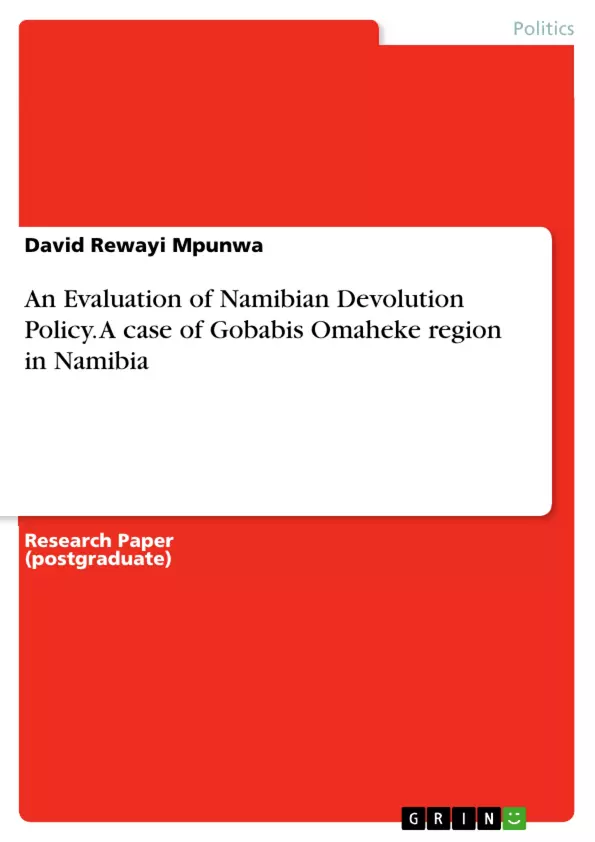This discourse unpacks the Namibian Devolution policy modus operandi and modus vivendi which were mooted in 1997 also in the Harambe prosperity plan document, then in the Poverty Reduction Strategy Paper and, most recently, in the Economic Development and Poverty Reduction Strategy (EDPRS) rubric. While Namibia has decentralized some of the services to sub-national states, the problem is that the Devolution process has not reached the phase of full devolution.
The researcher contends that the participation of local citizens and their proficiency of the local state of affairs contribute to the more accurate documentation and prioritization of human needs. The aim of this rubric was to evaluate the Devolution policy a case of Omaheke region in Namibia.
This survey attempted to achieve three objectives as highlighted below: To evaluate the Devolution policy in case of Gobabis Omaheke region in Namibia. To determine the perceptions of respondents regarding the implementation of Devolution policy. To identify community participation in a decentralised system. To derive, by way of recommendations, possible improvements on the Devolution policy.
This is a case study; hence qualitative research design was adopted as the research method to use in investigating the effectiveness of Devolution on service delivery in the Ministry of Education in the Omaheke Region.
Inhaltsverzeichnis (Table of Contents)
- CHAPTER ONE: INTRODUCTION
- Introduction
- Background of the study
- Research problem
- Research Objectives
- Significance of the Study
- Delineation of key Terms
- Outlines of the Study
- Conclusion
- CHAPTER 2: LITERATURE REVIEW
- Introduction
- Definition of Devolution
- Theories of Devolution
- Fiscal federal theory
- Public choice theory
- Public administration and Public finance theory
- Political economy theory
- Forms of Devolution
- Advantages of Devolution
- Arguments for Devolution
- Arguments against Devolution
- Unanswered issues on Devolution research gap
- Main argument of this rubric
- Challenges of Devolution
- Debates around the Devolution system
- Implementation of Devolution policies in African countries
- Devolution in Namibia
- Challenges faced during the implementation of the Devolution policy
- Devolution and Service Delivery
- Importance of capacity development in the Devolution system
- Coordination in the Devolution system
- Communities' participation in a decentralized system
- Conclusion
- CHAPTER 3: RESEARCH METHODOLOGY
- Introduction
- Research Design
- Case study
- Conceptual Research Framework
- Research population
- Sampling procedures
- Research Instruments
- Interviews
- Document analysis
- Data collection procedures
- Data analysis
- Ethical issues
- CHAPTER 4: DATA PRESENTATION AND ANALYSIS
- Interview findings
- Working years of experience of the respondents
- The respondents' understanding of the Devolution policy
- Perceptions of respondents regarding the implementation of Devolution policy
- Educational services before Devolution policy
- Provision of training on Devolution system
- Coordination of educational activities
- Coordination of activities at education directorate
- Coordination of activities between education directorate and Regional Council
- Community participation in education activities
- Direct participation of the Constituency Councillor and CDC members
- Reporting system in the delegation phase
- Responsibilities of staff members in the delegation phase
- The perception of respondents on service delivery
- Mechanisms to improve service delivery
- The perceptions on the contributing factors impacting the effectiveness of service delivery
- Perceptions of the respondents on improvement noticed in the delegation phase
- Document analysis
- Conclusion
- Chapter 5: Conclusions and Recommendations
- Introduction
- Observations
- Recommendations
Zielsetzung und Themenschwerpunkte (Objectives and Key Themes)
This study aims to evaluate the implementation of the devolution policy in the Gobabis Omaheke region of Namibia. The study seeks to understand the effectiveness of the policy in improving service delivery, particularly within the education sector.
- The effectiveness of the Devolution Policy in improving service delivery
- Challenges faced during the implementation of the devolution policy
- Community participation in the decentralized system
- The role of capacity development in the Devolution system
- The impact of the Devolution Policy on the education sector
Zusammenfassung der Kapitel (Chapter Summaries)
Chapter One introduces the research problem, objectives, significance, and scope of the study. Chapter Two provides a comprehensive literature review on devolution, including its definition, theories, forms, advantages, challenges, and implementation in African countries, with a specific focus on Namibia. Chapter Three outlines the research methodology employed in the study, detailing the research design, case study approach, research population, sampling procedures, data collection methods, and ethical considerations. Chapter Four presents and analyzes the data gathered through interviews and document analysis, focusing on respondents' perspectives on the Devolution Policy, its implementation, service delivery, and community participation.
Schlüsselwörter (Keywords)
Devolution policy, service delivery, education, community participation, capacity development, Namibia, Gobabis, Omaheke region, case study, implementation, effectiveness, challenges, decentralized system.
Frequently Asked Questions
What is the Devolution Policy in Namibia?
It is a policy aimed at decentralizing power and services from the central government to regional and local authorities to improve service delivery.
How does devolution affect the education sector in Omaheke?
The policy aims to bring educational management closer to the community, though challenges remain in reaching "full devolution" of services.
What are the main challenges of decentralization in Namibia?
Key challenges include limited financial resources, the need for better staff capacity, and coordination issues between regional councils and central ministries.
Why is community participation important in devolution?
Local citizens have a better understanding of their specific needs, which helps in prioritizing resources and holding local states accountable.
What is the "Harambee Prosperity Plan"?
An action plan by the Namibian government aimed at accelerating economic development and prosperity, which includes decentralization as a key strategy.
- Citar trabajo
- David Rewayi Mpunwa (Autor), 2022, An Evaluation of Namibian Devolution Policy. A case of Gobabis Omaheke region in Namibia, Múnich, GRIN Verlag, https://www.grin.com/document/1264275



